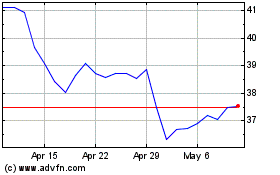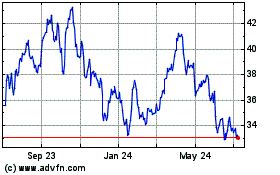Justice Department Files Lawsuit to Block Halliburton-Baker Hughes Deal -- Update
April 06 2016 - 11:42AM
Dow Jones News
By Brent Kendall and Alison Sider
WASHINGTON -- The Justice Department Wednesday filed an
antitrust lawsuit challenging Halliburton Co.'s planned acquisition
of rival Baker Hughes Inc., alleging that the deal would threaten
higher prices and reduced innovation in the oil-field services
industry.
The lawsuit, filed in a Delaware federal court, asserts that the
transaction would eliminate important head-to-head competition in
markets for 23 products and services used for U.S. oil exploration
and production, from drill bits to offshore cementing services.
"The proposed deal between Halliburton and Baker Hughes would
eliminate vital competition, skew energy markets and harm American
consumers," Attorney General Loretta Lynch said in a statement.
The companies pledged to fight the Justice Department lawsuit
vigorously. In a joint statement, they said they "believe that the
DOJ has reached the wrong conclusion in its assessment of the
transaction and that its action is counterproductive, especially in
the context of the challenges the U.S. and global energy industry
are currently experiencing."
The Wall Street Journal reported Tuesday that a government
lawsuit challenging the transaction was imminent.
The nearly $35 billion deal, originally announced in November
2014, proposed to combine the world's second- and third-largest
oil-field services firms, behind only Schlumberger Ltd. The
transaction has faced antitrust resistance around the globe,
including in Europe. The U.S. lawsuit Wednesday is the biggest
hurdle yet for the merger.
Since the deal was struck, the oil-field services industry has
faced severe setbacks, as persistently low oil prices have slashed
demand for the business of drilling wells and pumping oil and
natural gas.
Halliburton and Baker Hughes have been seeking to ease concerns
that their merger would slash competition by offering to sell off,
or divest, assets worth billions of dollars to other firms.
Halliburton and Baker Hughes said Wednesday their proposal would
"facilitate the entry of new competition in markets in which
products and services are being divested." They added, "Both
companies strongly believe that the proposed divestiture package,
which was significantly enhanced, is more than sufficient to
address the DOJ's specific competitive concerns."
The companies said their combination would create a more
flexible, innovative and efficient company that could reduce costs
for customers.
But the Justice Department has been highly critical of the
companies' divestiture proposal, saying the merged firm would
retain more valuable assets while selling less-significant ones to
third parties.
"Although the terms of Halliburton's proposed remedy continue to
change, it appears to be among the most complex and riskiest
remedies ever contemplated in an antitrust case," the department
said in its lawsuit.
While most mergers continue to receive government approval, the
legal challenge is the latest evidence that U.S. antitrust
enforcers in the Obama administration are pushing back against
transactions they believe raise significant threats to
competition.
Last year, the Justice Department sank several deals, including
General Electric Co.'s planned sale of its appliance business to
Electrolux AB and Comcast Corp.'s planned acquisition of Time
Warner Cable Inc. Both of those deals were eventually
abandoned.
The Federal Trade Commission, meanwhile, is in the midst of
court proceedings against a proposed merger of Staples Inc. and
Office Depot Inc.
Write to Brent Kendall at brent.kendall@wsj.com and Alison Sider
at alison.sider@wsj.com
(END) Dow Jones Newswires
April 06, 2016 11:27 ET (15:27 GMT)
Copyright (c) 2016 Dow Jones & Company, Inc.
Halliburton (NYSE:HAL)
Historical Stock Chart
From Mar 2024 to Apr 2024

Halliburton (NYSE:HAL)
Historical Stock Chart
From Apr 2023 to Apr 2024
